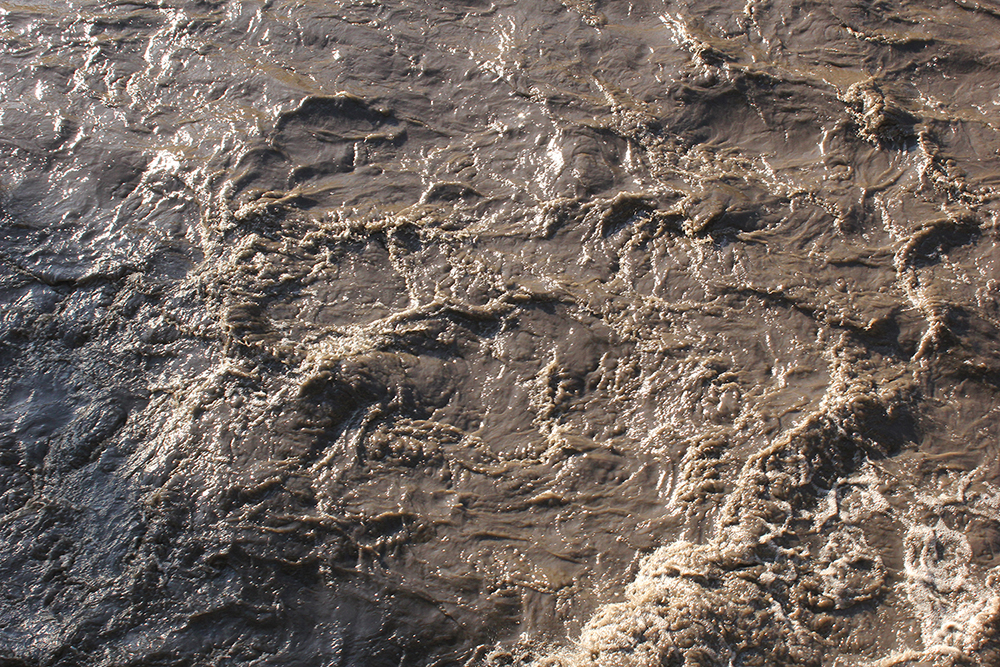
Tengiz Tskhovrebadze has been fishing outside Chiatura for 15 years as a tar-black river flows through his hometown. A 59 -year-0ld fisherman lives in the middle of Chiatura, an industrial town in western Georgia, with one of the largest manganese reserves in the world. The large mine complex that provides the manganese factory with the ore is located by the river Kvirila. Tskhovrebadze sees the deplorable condition of the river polluted by the Manganese factory every day.
„In my childhood, we used to hang out along this river with friends before nightfall and catch a lot of fish. It was my favorite hobby and source of income for my family. Along with many problems, the cleanliness of the Kvirila River has passed away,” Tengiz Tskhovrebadze recalls sadly.
Polluted water is one of the major problems for the population and they are particularly concerned about the fact that despite their repeated requests, no one responded to eliminate the problem.
Alina Kapanadze a resident of Chiatura, said that the damage to the environment caused by the extraction and processing of manganese is enormous. According to her, it may be the cause of the sharp increase in cancer cases and other diseases. This is the widely accepted presumption by locals, but no such statistics exist.
“Life here has become impossible, we have applied so many times to the municipal government, but nothing has changed so far. We have reached an ecological catastrophe Manganese is not cleaned with proper filters. This is the reason for pollution,” said Kapanadze, adding, “The river is full of black silty mud.”

Green Alternative, a non-governmental environmental organization, also talks about the existing problem. According to Irine Svanidze, the representative of Green Alternative, the clarifiers which purify the water are in terrible condition and the poorly filtered water flows into the river.
“The factory, which processes the manganese uses outdated clarifiers, that don’t filter the water properly,” she said.
According to the reports of Green Alternative, Georgian Manganese the factory that comprises all the other industrial enterprises connected to the mining and processing ore, plans to reconstruct the existing clarifiers and arrange an additional a three-chamber clarifier. But the company also plans to increase the annual productivity of the enterprise by almost 9 times. It is not clear if the addition of a single chamber clarifier would be sufficient to deal with increased productivity.
Nodar Chachanidze, Head of the Imereti Bureau of the Governance Monitoring Centre, spoke about the problems in the city of Chiatura and stressed that the Kvirila River had become an unresolved problem in the city. As he points out, the ore has been washed before final use into the Kvirila since Soviet times, although the city has never had such a visible problem with clarifiers and filters. According to Chachanidze, no one takes responsibility for dealing with environmental problems. Neither the company nor the state, but the fact is that the situation is getting worse every day.
“A dam in the center of the city, around which all the ore waste is collected is very harmful to health”
Georgian Manganese is considered to be the main contributor to pollution. The company said in September 2020 that it was working on a pilot program to clean up the river. But 2021 is coming to an end and Georgian Manganese itself confirms that the problem has not been resolved because “it is a large-scale project and it takes time.”
Georgian Manganese’s director of environment protection, Irakli Nozadze says the decades-long problem can’t be solved quickly and just a few measures are not enough.
“We are working on the rehabilitation of the Ghurgumela sludge reservoir, sludge pipes should be made this is a very large–scale project and I hope we will get the result when the river will not be polluted due to the production process,” said Nozadze
Tengiz Tskhovrebadze no longer trusts the promises made by the company and believes that the company is violating the ore mining rules to save money. He said people are leaving the district due to severe environmental problems coupled with economic ones.
Mr. Tskovrebadze also talked about the tourist potential of the city.
“I imagine tourists boating in the clean river, which can only happen in Georgia of future, but at this stage, there is no need to talk about the future because the current crisis has a black color and it is called Kvirila River,’’ he said.
According to him, both local and central governments turn a blind eye to the problem..
People no longer fish here, he says.
“Nobody cares about us at all. When I look at the Black River from the bridge, two questions come to my mind, don’t we live in this country? Aren’t we humans.”